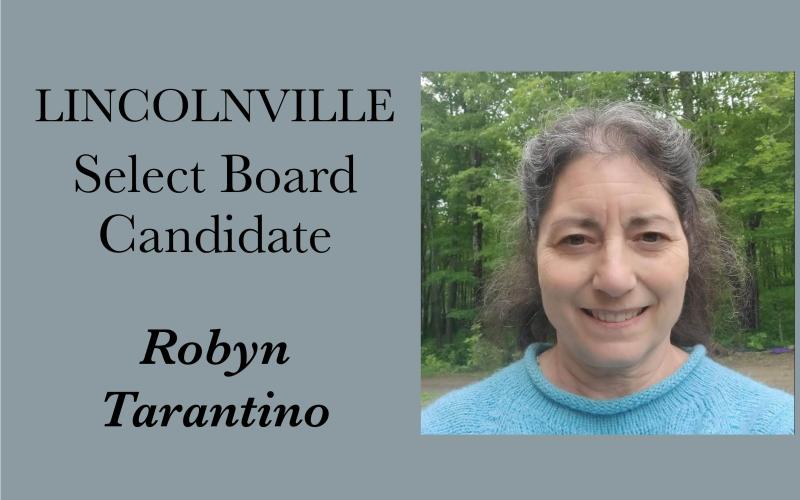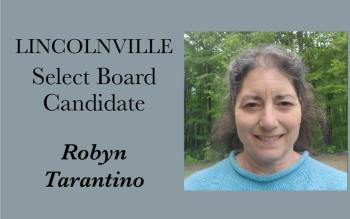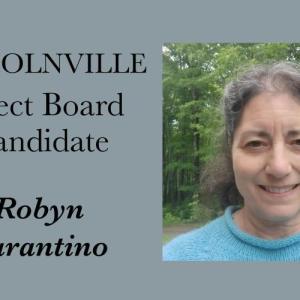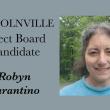On the issues: Lincolnville Select Board Candidate Robyn Tarantino
Wed, 06/07/2023 - 9:00pm
On June 13, voters in Lincolnville will elect two citizens from a slate of three candidates to serve on the Lincolnville Select Board. There are two open seats this June, both three-year terms. Candidates are Jean Botley, incumbent Michael Ray and Robyn Tarantino.
Penobscot Bay Pilot has posed questions to each candidate, providing the opportunity for the public to better understand their position on issues important to the town and region. Here, Robyn Tarantino discusses her positions on various topics.
Please provide a short biography of yourself.My great-grandparents moved off of Eagle Island in Penobscot Bay and bought a dairy farm on High Street in 1914, which they, and eventually my grandparents, farmed until about 1940.
World War II split my family and my mother settled in Connecticut after the war. Although I was born in Connecticut, I spent all summer, every summer, for the first 21 years of my life on the farm with my grandmother — gardening, watching other dairy farmers cut our hay fields, and raking blueberries.
It has always been the place that I consider to be my home. Finally, in 2016, I had the opportunity to relocate permanently back to Lincolnville, to live here on my family's farm with my husband (Tim Guilfoyle) and our dog and two cats.
We are empty nesters with three grown children and five grandchildren (all aged four or under), and we both work remotely in computer-related fields for healthcare industry employers.
What are the three most pressing issues facing Lincolnville today, and how would you like to see them resolved?
In addition to my career in healthcare research I have also enjoyed some unforgettable experiences as a singer. My other hobbies include yoga, cooking, reading and hiking. And curling! As a year-round resident curling is my favorite cold weather hobby!
What are the three most pressing issues facing Lincolnville today, and how would you like to see them resolved?
**Farmland preservation, **affordable housing, **rising sea level / storm surge and its impact on our commercial properties at Lincolnville Beach.
Since affordable housing and rising seas are addressed in the next two questions, I will focus on farmland preservation here. (Full disclosure: Growing up with my grandmother inculcated in me the belief that having the ability to grow our own food is the most important way to secure our future.)
One of our great blessings in Lincolnville is the bounty of locally grown foods of all kinds which are available to us, but every acre of active or former farmland that is developed for housing puts the future of this bountiful harvest at risk.
A hundred years ago, most of Lincolnville was open fields with scattered woodlots, but nowadays the landscape is almost completely wooded.
Of the 130 acres or so that are still in my family, we have only 18 acres of open fields and another 11 of blueberries. The remainder is overgrown pasture.
Lincolnville is full of fallow fields and 80-year-old forests. Ten percent of Maine's farmland was lost to development from 2012 to 2017, and even more since then.
The pandemic inadvertently put Maine on the map as a destination for remote workers — I think everyone reading this understands how much property values have increased. At the risk of sounding alarmist, we are jeopardizing our future with our denial of climate change, water resource mismanagement in much of the western U.S., and public policy that values land primarily for its development potential.
Our arable land is invaluable to our future food security, and right here in Lincolnville we have prime farmland that has fortunately avoided PFAS contamination. I think it would be exciting to find ways to put some of our existing farmland back into active agricultural use, and I am hopeful that this is something that the Heart & Soul project may be able to address.
We're fortunate that we're in the process of brainstorming about our future with the Heart & Soul project in addition to our comprehensive plan update!
Damaging coastal storms and rising ocean levels are a reality now. Flooding may become more constant and affect private and public properties. How should the town address rising ocean, lake and river levels?
Norton's Pond and the Lincolnville portion of Megunticook Lake are subject to artificial dams, so as far as my current understanding goes, we can manage levels in these bodies through responsive dam management and collaboration with Camden.
I think we are fortunate that the topography of most of our oceanfront land gives us a buffer for a few decades, since the land tends to rise to at least four feet above sea level pretty quickly, and our structures tend to be set back from the shoreline.
Our big problem is Lincolnville Beach. I think all of our commercial property between Route 173 and the Beach Cottage Inn, including the ferry terminal, is at risk. The structures are all too close to sea level.
I am no expert, but I know that there are many initiatives at the state (and hopefully federal) level to fund improvements or other mitigation strategies. As I mentioned in the previous question, we're fortunate that we're in the process of brainstorming about our future with the Heart & Soul project in addition to our comprehensive plan update!
We can apply the collective imagination and energy of our fellow Lincolnvillians to this problem now, rather than later. One last aspect that I do think about: I worry that rising sea level could trigger our state DOT to 'elevate' Route 1 (a la Bath) at some point in the next decade or two. This would be an even bigger threat than flooding for those businesses.
With Lincolnville’s population increasing, how should the town address housing pressures.
With Lincolnville’s population increasing, how should the town address housing pressures.
I would like to designate some areas where we could build higher density housing (hopefully keeping open fields available for agriculture). I am hopeful that our culture is moving toward smaller, more efficient houses rather than the McMansions of the past 35 years. I admire the British model where houses are smaller and semi-detached, allowing more contiguous spaces for farming and the natural environment. Risking redundancy - but here is another great opportunity for us with the Heart & Soul project!
How will you protect the Lincolnville taxpayer as you shape and govern a municipal budget, and juggle various interests that request municipal funding throughout the year?
My service on our town Budget Committee has shown me that our town employees generally show common sense and fiscal restraint when requesting their annual budgets, but one area that could be improved is our real estate assessments. I have come to realize that my own valuation is very inaccurate; in my favor, not the town's.
If my house is undervalued, my taxes will be lower than they ought to be, and I will not contribute my fair share to our municipal budget. I would like to collaborate with our assessors to make sure that we have an accurate, up-to-date valuation of our tax base.
As far as unforeseen municipal expenditures throughout the year — there are strict limits to what un-budgeted items the Select Board can approve without going to the voters via a special town meeting. It is the voters at town meeting (annual or special) who have the final say over any necessary juggling. Remember: we, the voters — We.Are.The.Government. We elect people to serve our collective needs. At the special town meeting in May, when we voted for the school budget, other than the committee members and town employees who had to be there, there were only four of us voters in attendance. Just saying...
How do you envision the future of solid waste processing for the four towns; i.e., recycling, waste stream reduction?
I have been an ardent "Reduce/Reuse/Recycle"-er for as long as this has been a 'thing'. I grew up in the 1960s and 1970s, and I remember what it was like before the Clean Air and Clean Water Acts, and before the EPA existed. I was also a Girl Scout. Even when my kids were still at home, our household of five only produced one kitchen-sized bag of garbage each month because we were scrupulous about composting and recycling, and avoided buying convenience foods, overly packaged items and disposable 'anything'. (except diapers - full disclosure - we did always use disposable diapers. I guess everyone has a vice, and this was mine!).
I think we are fortunate to be part of the four partner towns in the Midcoast Solid Waste Corporation. We have access to more recycling than most other communities in our state. Even so, sometimes, despite our best efforts, our recyclables will still end up in landfills or incinerators due to lack of consistent buyers for our recycled materials.
Here's where we come in as individuals! The "Reduce" in 'Reduce/Reuse/Recycle" is something that each of us can do, if we have the will. This is "waste stream reduction" and it is not only achievable - it has the added benefit of improving our health!
Convenience foods are heavily packaged, which all goes into our waste/recycling stream - and convenience foods are heavily processed. The link between consumption of heavily processed foods and chronic illness has been well and fully established. Please trust me - I have worked in healthcare research since 1993. If we cook our own food rather than buying prepared convenience foods,we improve our health while reducing waste.
As the Midcoast continues to grow its outdoor and recreational economy, more people and visitors will be boating on lakes and ponds, hiking, and biking. How do you hope to balance demand with environmental protection?
Water quality on our lakes and ponds is threatened by runoff from lawns and septic systems, a known problem which we are already monitoring, and sewer system at Lincolnville Beach was designed and built to mitigate problems there.
My perception is that we already have a well-established local infrastructure of parks, trailheads, public boat launches and swimming areas, and that parking capacity 'naturally' limits usage of these facilities.
As for biking, I am much more concerned for the bicyclists' safety on our roadways, rather than any adverse environmental impact biking can have. Living at the Searsmont end of town, I admit that my personal experience is primarily at the two ends of Rte 173 - Levenseller Pond and Lincolnville Beach. My family uses both regularly (already swam in both places by Memorial Day!) and while picnic tables and trash receptacles would be a nice addition at Levenseller — those cost money and need maintenance, so I would put them very, very low on our town's priority list. I do like the canine poop bag stations in Camden and Belfast, and I think it would be nice to investigate the feasibility of putting stations at the Beach, Breezemere Park, and at our new Penobscot Park.
Should Union 69 (Lincolnville, Appleton and Hope K-8) consider dissolving and joining with Camden and Rockport for a regional school unit that would comprise the five towns and incorporate public education K-12?
I prefer to keep our current setup. We have more control as a union of three communities than we would have in a bigger region, and our elementary-aged kids have long enough bus rides already! That being said - I fully support funding our schools well enough to support robust STEM, arts and physical education programs while paying our staff what they deserve. Our town's future depends on how well we educate our children today.
What is your favorite place in Lincolnville?
What is your favorite place in Lincolnville?
Now this is a very tough choice! Up on the ridge behind our house, watching a full moon rise while the sun sets... followed closely by scoring the 4-top in front of the fireplace at the Whale's Tooth on a cold winter's night!
Free space to offer additional thoughts!
Free space to offer additional thoughts!
My current community service:
*I am the secretary on the Lincolnville Budget Committee
*I am a volunteer on the M. Alton French Scholarship committee
*I am on the Board of Directors for the Down East Singers, and assistant to the Treasurer
*I am a volunteer hike leader with the Appalachian Mountain Club
*I volunteer with the Restorative Justice Project in Knox and Waldo counties with juvenile and young adult participants in the harm repair program and with the Re-entry Center program at the Waldo County jail.
Event Date
Standard Post





























